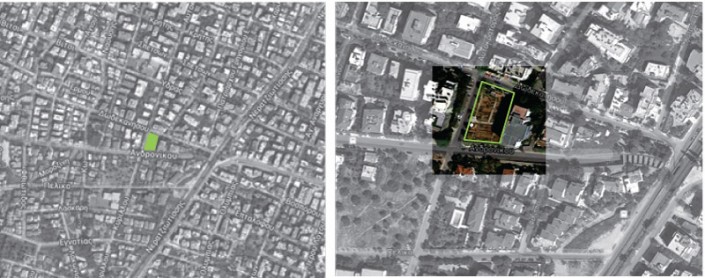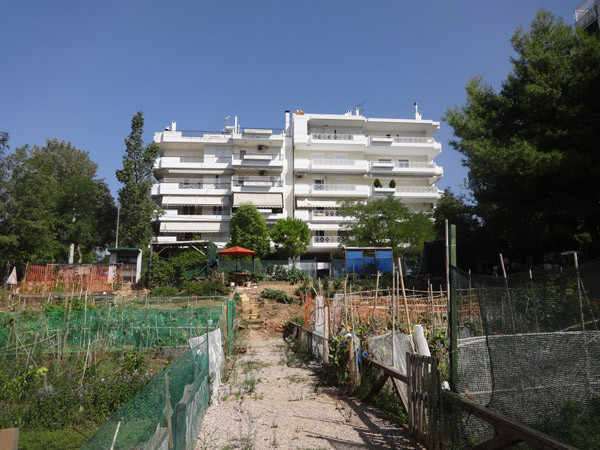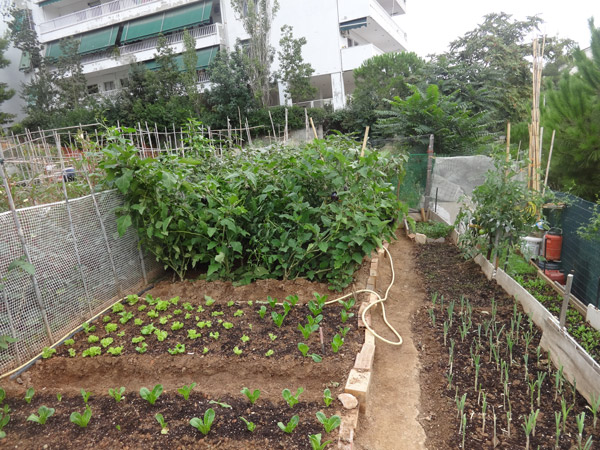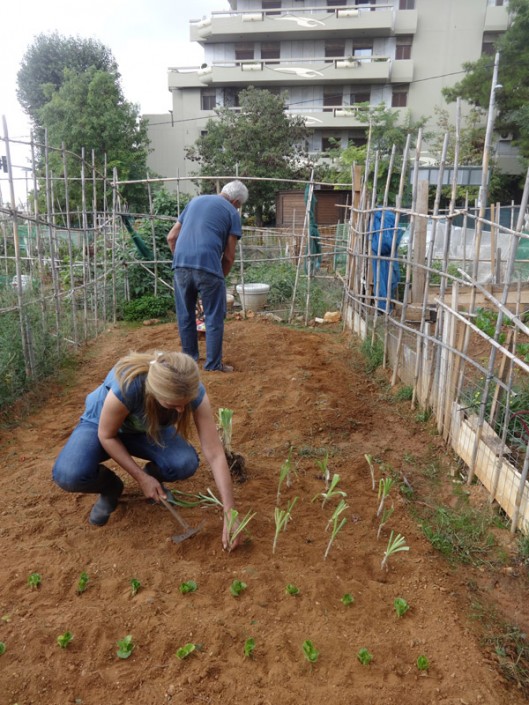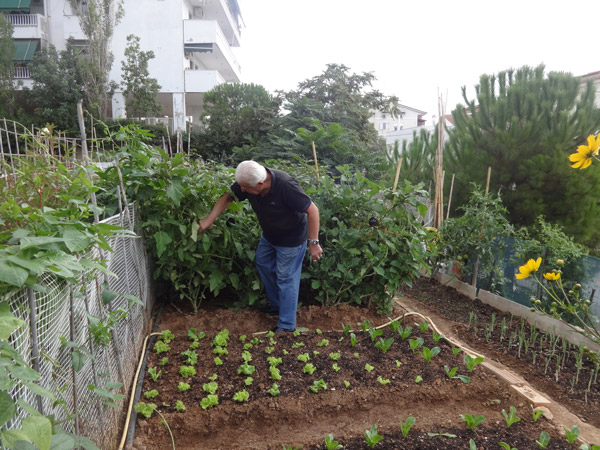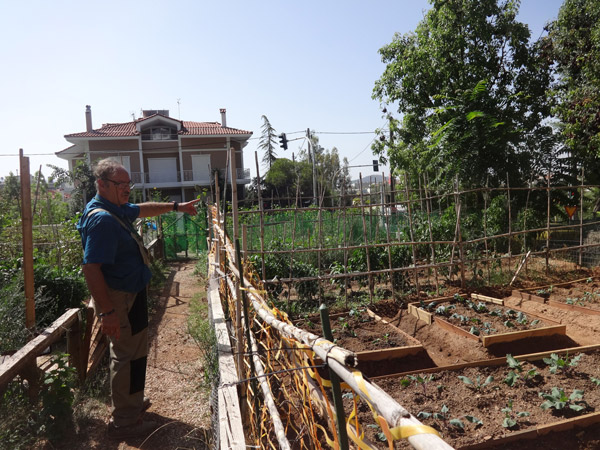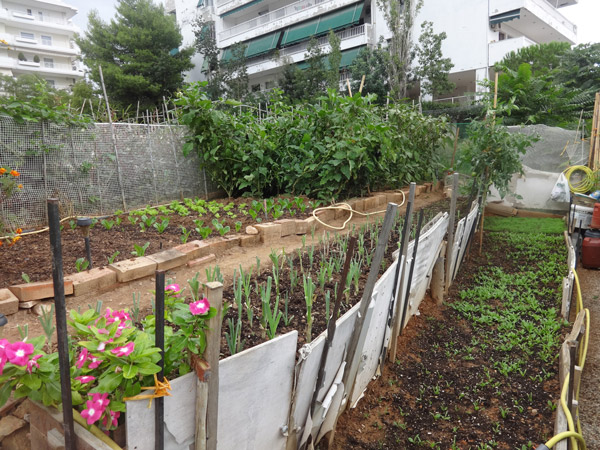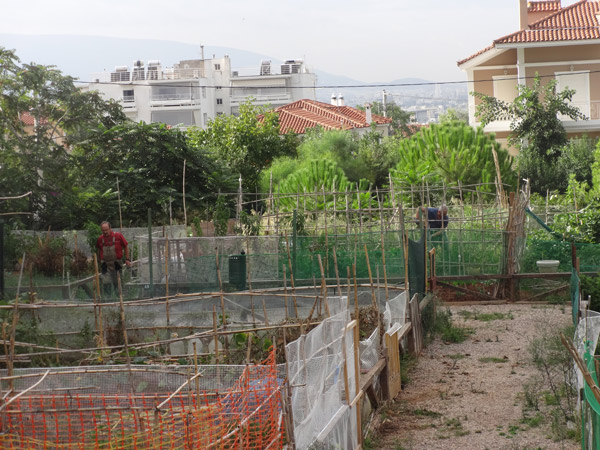City growers: The Municipal urban vegetable garden of Maroussi
Anthopoulou Theodosia|Nikolaidou Sofia
Quartiers, Social economy
2015 | Dec
There is a limited tradition of urban agriculture in Greece, while the term was completely unknown until very recently, even among urban planning experts. Urban farming started to spread as a concept across social strata, groups of citizens and local communities after 2010, at a time when the crisis deepened and civil protest and social solidarity movements acquired special dynamics.. Livelihood, quality of life, agro-environmental education and food supply to cities, particularly in times of crisis, were some of the key themes emerging out of those movements.
Municipal gardens are the most widespread form of collectively managed gardens in Greece. They were launched in 2012 and multiplied rapidly across the country since then. It seems that the growing problems of social and economic deprivation, alienation and degradation of the urban environment, have led several Municipalities in the country to include such initiatives in the framework of their social policy. Municipal authorities promote them in order to support vulnerable groups (the unemployed, pensioners, low-earners, single parents and families with many children, etc.), strengthen social solidarity and tackle mental health issues. Landscaping and environmental management (greening of the city, composting of organic waste, etc.) also have their place among the social benefits of urban gardens.
The organisation of municipal vegetable gardens is almost identical everywhere. The Municipality allots fenced municipal / community areas (urban allotment gardens), where it has enriched the soil and has provided water supply. Only organic farming is allowed while, in most cases, part of the production (10-15%) is allocated to the Municipality’s social grocery.
The main incentive to apply for an allotment in a municipal vegetable garden, as recorded by an on-site survey in northern Greece (Ανθοπούλου etc. 2013), is food production itself; namely the need for fresh, organic, healthy food to make sure that “I know what I eat”. Another important incentive is the need to trim household budgets for food expenditure, which mainly concerns households with lower incomes. To some, it is also a way to reconnect with the earth, the nostalgia for their village, the experiences of childhood. As growers say, when using the vegetable garden, the first harvests often bring new experiences and unexpected emotions: the joy of creativity amid the depression of the crisis, companionship and new “neighbourly relations” in the field, entertainment with small celebrations and collective kitchens, meditation and strengthening of social solidarity. These motivations can be found across age groups; primarily pensioners , but also younger generations that have to deal with unemployment and its psychological impact. They find a creative outlet and a network of mutual social support. “The main reason to get involved with the land was to learn a few things, to get moving, because I was unemployed for some time; I wanted something to hold on to… work therapy let’s say, what else could I do? Watch TV all day and go for coffee with my friends (…)? Even if I do find a job, I will not leave the vegetable garden. I spend my time pleasantly, I make friends, I can see that I create something… that I succeed somehow” (Sofia, Municipal Organic Field of Alexandroupoli).
In this context, since the crisis has decreased the interest of investors in the construction industry and the real estate market, the initiatives for municipal vegetable gardens multiply and occupy unused parts of the urban fabric in major cities. This trend has become very important in the case of the Attica basin, where the degradation of quality of life and the depletion of outdoor open spaces reinforce the need to restore the contact of residents with nature and rural environments. Given the general drop in construction activity in the metropolitan area of Athens, an opportunity has arisen in unplanned city areas for vacant lots and unexploited municipal land to become municipal vegetable gardens, serving as oases of greenery and social activity.
The case of the municipal vegetable garden of Maroussi, launched in 2012, in the area Neo Terma-Palaio Psalidi, is an interesting example of municipal land used for a productive social purpose. Maroussi has undergone intense transformations due to a building boom that started in the 1990s and was followed by the erection of huge shopping centres during the period of the “Athens 2004” Olympic projects. It is in this context that an abandoned plot, no longer attractive for real estate development, has been re-incorporated into the neighbourhood fabric as a vegetable garden.
The municipality had two goals:
“First, to use unexploited and abandoned open spaces, which are redesigned as vegetable gardens for greening and beautifying neighbourhoods and also to facilitate socialising, activation, be a creative outlet, offer social care and solidarity for the city residents, at a time of crisis” (http://www.econews.gr/2012/04/01/dimotikos-laxanokipos-marousi/).
The plot covers 1,500 square metres and was bequeathed to the Municipality. Although it has been included in the city plan since 1936, a building permit has never been issued by the planning department of the Municipality. According to the planning department, a Multiplex Cinema project proposed during the Olympic Games preparation period was dropped, thanks to the mobilisation of the locals. As it had been neglected for years, it had become an informal waste dump. Its re-use by the residents turned a degraded area into a lively part of the city and gave a new active role, and a new social identity to the site. It helped to reconstruct the neighbourhood and to make the urban environment greener.
The vegetable garden is divided in 40 parcels of 25 sq.m. The distribution to growers-residents was based on demand and social criteria. The Municipality cleaned the property up, brought in new soil and put the basic infrastructure for the operation of the vegetable garden in place (fences, water supply with water tank). Only organic cultivation is allowed, which requires more specialised knowledge than conventional methods. Panagiotis, a pensioner with an allotment on site says:
“Do you think agronomists know anything about this stuff? We are all farmers now, thanks to the Internet (…). I research and experiment all the time, but it requires perseverance and passion. The more you look into it, the more you learn”.
One of the main benefits for citizens working in the vegetable garden is that they satisfy their need for companionship, as well as entertainment and stress reduction through gardening:
“It has now become a daily need to work with the vegetable garden; I have dug, I have sweated here… what else could I do with my mornings? Go for coffee with my friends?” says Eleni, a local housewife. Second, it covers household needs for fresh and organic garden goods at a lower cost. For some growers, the vegetable garden revives childhood memories and the flavours of the family table.
“Back in the old days, we used to cultivate in our yards in Maroussi, there were orchards and lots of water… all the way from Kifisias Avenue to Kymis Street, where the Olympic Stadium stands today. The drains would open and the fields were watered all the way down there; I remember in the 1960s, I was a child and we made paper boats and would then find them down there (…). My mother would only use seasonable vegetables for our meals; we would only have tomatoes in the summer and they used to smell heavenly then (…)” (Panagiotis, pensioner).
For others, it is simply the beneficial contact with the earth:
“We come here every day with my wife. It is a pleasure, a physical exercise, a way out. Despite the problems we may have, be it health-related or family problems, we never abandon the garden (…). When I was young, I helped my parents in the fields, like every child in the village… I like to do it to this day, it’s my passion (…). Financially no, it’s not cheaper, I dare say it’s more expensive, but I eat pure stuff; I give them to my children and my grandchildren, to neighbours when they ask, my wife knows people from our parish in the Church; what are we do to with all this produce, just the two of us?” (Giorgos, pensioner).
Despite the positive response from citizens across Greece, as in the case of the Maroussi vegetable garden, there is no institutional safeguard for the permanent agricultural use of urban farms nor is there a given prescribed period for their operation.This makes them vulnerable to land market pressures. Municipal vegetable gardens remain a short-term action in the context of social care resulting from the economic crisis and are not a statutory land use in the urban plan of the cities hosting them. At the moment, it seems that municipal vegetable gardens will remain in place for as long as the crisis lasts due to the lack of investor interest.
Entry citation
Anthopoulou, T., Nikolaidou, S. (2015) City growers: The Municipal urban vegetable garden of Maroussi, in Maloutas T., Spyrellis S. (eds) Athens Social Atlas. Digital compendium of texts and visual material. URL: https://www.athenssocialatlas.gr/en/article/city-growers/ , DOI: 10.17902/20971.30
Atlas citation
Maloutas T., Spyrellis S. (eds) (2015) Athens Social Atlas. Digital compendium of texts and visual material. URL: https://www.athenssocialatlas.gr/en/ , DOI: 10.17902/20971.9
References
- Ανθοπούλου Θ, Παρταλίδου Μ, Νικολαΐδου Σ, κ.ά. (2013) Αστική Γεωργία. Κοινωνική ένταξη και Βιώσιμη Πόλη. Μελέτη δύο αστικών δημοτικών αγροκηπίων (Δήμοι Θέρμης και Αλεξανδρούπολης). Αθήνα.
- Anthopoulou T, Kolokouris Ο, Nikolaidou S, et al. (2015) Aux arbres citoyens ! Le mouvement d’agriculture urbaine, une forme participative d’appropriation de l’espace public. In: Paoli JC, Vianey G, and Requier-Desjardins M (eds), Accaparement, action publique, stratégies individuelles et ressources naturelles : regards croisés sur la course aux terres et à l’eau en contextes méditerranéens, Options Méditerranéennes : Série B. Etudes et Recherches, Montpellier: Montpellier : CIHEAM, pp. 339–349. Available from: http://om.ciheam.org/om/pdf/b72/00007151.pdf.
- Partalidou M and Anthopoulou T (2015) Urban Allotment Gardens During Precarious Times: From Motives to Lived Experiences. Sociologia Ruralis, Wiley Online Library: 18.
Related internet sites
Information on the municipal vegetable garden of Maroussi:

